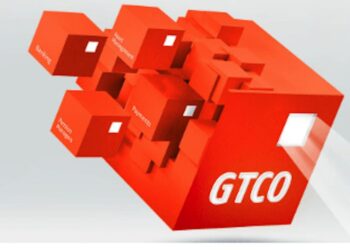The GDP of the United States of America contracted by 1.4% in the first quarter of 2022, representing a sharp fall from the 1.7% growth (6.9% annualized) recorded in Q4 2021. On the other side of the divide, the Russian ruble appears to be strengthening despite severe pushback in the shape of the toughest economic sanctions ever imposed on a country.
Here at home, the exchange rate between the naira and US dollar closed at N419/$1 on Friday compared to N418.33/$1 recorded as of the close of trading activities in the previous week.
Nairametrics compiles a list of notable events across macroeconomy, equities market, regulators, and the crypto market that made the headlines during the week.
MACROECONOMY
Exchange rate: Naira closed weaker during the week
- Naira closed weaker during the week compared to the previous week at the official Investors and Exporters window, as the exchange rate between the naira and US dollar closed at N419/$1 on Friday compared to N418.33/$1 recorded as of the close of trading activities in the previous week.
- Meanwhile, a total of $788.44 million in FX value exchanged hands during the week against $600.42 million traded in the previous week.
- The parallel market also saw the naira grow weaker as it closed at N590 to a dollar compared to N586/$1 recorded in the previous week. This brings the market differential between the parallel and the official market to N171/$1.
External Reserve: External Reserve retracted its movement in the week
- Nigeria’s external reserve retracted its movement in the week with a $196.13 million decline (WoW) to stand at $39.62 billion as of Thursday, 28th April 2022, compared to $39.81 billion recorded as of the previous week.
- The decline in the country’s reserve level is largely attributed to the continuous intervention by the Central Bank of Nigeria in the official FX market, as a means to manage the volatility in the market.
Russia-Ukraine war: AfDB designs $1.5 billion emergency food production plan for Nigeria, Africa
- The economic fallout of the Russia-Ukraine war has pushed the African Development Bank (AfDB) to devise a $1.5 billion Africa Emergency Food Production Plan.
- The African Development Bank’s emergency food plan is currently before the Bank’s Board of Directors for approval. It is set for implementation by the end of May 2022 and will cover all African member countries of the Bank
REGULATION
CBN grants Airtel final approval for full Payment Service Bank license
- The Central Bank of Nigeria (CBN) has granted final approval for Airtel subsidiary, SMARTCASH Payment Service Bank limited (‘Smartcash’) to operate a Payment Service Bank (‘PSB’) in Nigeria.
- Airtel’s complete PSB license would allow it to operate financial services in Nigeria, including receiving cash deposits, processing payments and remittances, issuing debit and prepaid cards, operating electronic wallets, and other services.
SEC says the capital market can fund the government
- The Securities and Exchange Commission (SEC) has reaffirmed the capital market’s ability to fund the government’s development objectives by providing the required infrastructure.
- SEC reaffirmed the importance of the capital market in a country’s development by providing long-term money for infrastructure development.
CBN grants Airtel full super-agent license
- The Central Bank of Nigeria (CBN) has awarded Airtel Mobile Commerce Nigeria Ltd, a subsidiary of Airtel Africa Plc, the full super-agent license to operate as an agency network
- The super-agent license is distinct from the Payment Service Bank (PSB) license for which MTN received approval in principle on November 4, 2021.
- Super agents are businesses that have been licensed by the CBN to recruit agents for agency banking, which involves providing financial services to communities on behalf of banks to increase financial inclusion.
MARKETS
Capital Markets: NGX ASI on its way to 50,000 basis points
- The NGX closed on a positive note amidst sell-offs and buy-interests as the benchmark All-Share Index (ASI) appreciated by 164 basis point.
- The NGX ASI closed at 49,638.94 points, to reflect a growth of 1.64% from the previous trading day and a Year-to-Date (YTD) return of 16.21%. Meanwhile, the market capitalization grew by N431.92 billion.
- As at the close of the market on Friday 29th of April 2022, the stock exchange market value currently stands at N26.76 trillion.
Fixed Income: S&P Sovereign Bond index gains 0.21%
- The S&P Sovereign Bond index gained marginally by 0.21% during the week under review to close at 609.72 index level, bringing its year-to-date performance to +7.01%. Similarly, the money market index skyrocketed by 120.5% to 12.5% for its overnight rate during the week, while the Open Buy Back rate surged by 145% to close the week at 12.25%.
- We however saw an undersubscription for the 91-Day Nigerian Treasury Bills auction during the week. The stop rate dipped marginally by 0.01% from 1.75% to 1.74%, resulting in a subscription of N2.67 billion as against an offer to raise N2.68 billion.
- On the other hand, a flat movement in the stop rate could not deter investors from over-subscribing the 182-Day T-bills with subscriptions rising as high as N13.58 billion compared to an offer of N2.02 billion. A total of N8.23 billion was allotted from the registered subscription.
- Meanwhile, the 364-Day Treasury Bills saw a 0.34% uptick in its stop rate, registering a total subscription of N233.28 billion, hereby surpassing the initial offer of N116.27 billion.
Flour Mills Gets Regulatory Greenlight for the Acquisition of Majority Stake in Honeywell Flour Mills
- On Friday, Flour Mills of Nigeria (FMN) announced that it had obtained all the necessary regulatory approvals to acquire a 71.69% stake in Honeywell Flour Mills (HFMP) and another 5.06% stake in HFMP held by First Bank. The firm stated that it can “confirm the transaction has now been consummated by the parties.”
- The press release stated that the acquisition has been approved by all relevant regulators, namely the Federal Competition and Consumer Protection Commission (FCCPC), Nigerian Exchange Limited (NGX) and the Securities and Exchange Commission of Nigeria (SEC).
INTERNATIONAL
US economy contracted in Q1 2022
- The gross domestic product of the largest economy in the world, the United States of America contracted by 1.4% in the first quarter of 2022. This represents a sharp fall from the 1.7% growth (6.9% annualized) recorded in Q4 2021.
- This represents the worst performance by the US economy since the pandemic recession in the second quarter of 2020. Notably, gross domestic product, adjusted for inflation, declined 0.4 percent in the first quarter, or 1.4 percent on an annualized basis.
- The decline was mostly as a result of the two most volatile components of the quarterly reports: inventories and international trade. Lower government spending was also a drag on growth. However, measures of underlying demand showed solid growth.
Ruble emerges stronger 3 months into the Russian-Ukraine war
- Russia entered the third month of its invasion of Ukraine, with no sign of an end in sight. Despite severe pushback in the shape of the toughest economic sanctions ever imposed on a country, the ruble, the Russian currency, appears to be strengthening.
- What’s become evident is that, despite an enormously broad package of sanctions on Russia’s government and oligarchs, as well as an exodus of foreign enterprises, the moves are mostly ineffectual if foreign nationals continue to consume Russian oil and natural gas, which supports the ruble.
Ruble’s success against western sanctions prompts Russia’s interest rate reduction to 14%
- The Central Bank of Russia has lowered its benchmark interest rate to 14% from 17%, citing recent weekly data that shows current price growth rates are slowing due to the strengthening of the ruble and cooling of consumer activity.
- Despite fierce opposition in the form of the strongest economic sanctions ever imposed on a country, the Russian currency, the ruble, looks to be strengthening. The ruble was trading at 70 rubles per dollar on Friday, 29 April, down from 81 rubles per dollar on February 24, the first day of the invasion.
CRYPTOCURRENCY
Binance Captures 30% of $1.62 Trillion Crypto Spot Volume in March
- Binance, one of the world’s leading cryptocurrency exchanges by trading volume, captured 30% of spot volume market share in March, according to a report by CryptoCompare. The market share rose from 29% in February.
- According to the report, the exchange handled $490 billion of spot trades in March, a 15% increase from the month prior. Binance was followed by Coinbase (COIN) at $81.9 billion (down 12%) and OKX with $75.9 billion (down 26%), which both accounted for 5% and 4.7% of the market share.
Institutional Investors Divest $17 Million Worth Ether in 3rd Consecutive Week of Selloffs
- It looks like institutional investors have shifted their attention from Ethereum, the second-largest cryptocurrency by market capitalization, to competing for layer-1 blockchains, with capital inflows for altcoin investment products increasing last week, while Ether based products posted outflows for the third week in a row.
- Data from CoinShares’ latest Digital Asset Fund Flows report shows that investors last week loaded up on $3.5 million worth of Avalanche (AVAX), Solana (SOL), Terra (LUNA) and Algorand (ALGO) funds while capital outflows from Ether products totalled $16.9 million.
- As previously mentioned, it marks the third straight week that Ethereum products have seen outflows, bringing the total over that time to $59.3 million. This puts Ether’s Year-to-Date (YtD) outflow at 35% representing $169 million from the second-largest blockchain.
AXIA Announces the Official Launch of the AXIA Network
- AXIA, the team behind the first-ever hyper-deflationary token, announced the mainnet launch of its blockchain, the AXIA Network. The new network is designed to provide a “hyper-deflationary” economic model in which the cryptocurrency becomes more and more scarce as its adoption grows.
- Nick Agar, the founder of the platform, in an earlier interview with Nairametrics, had teased the launch of the AXIA Network, which he described to be a layer 1 blockchain. He further went on to tout that the blockchain was built to be the most inclusive, innovative blockchain ever seen.
- The AXIA blockchain is a third-generation blockchain that attempts to address problems like the lack of interoperability, speed and accessibility. The AXIA network uses a participatory hyper-deflationary system. This implies that all activity on the blockchain and within the ecosystem helps to ensure that AXIA Coin becomes scarce over time.


















